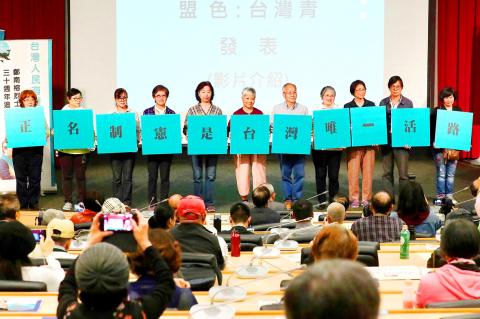The pro-Taiwanese independence Formosa Alliance is to part ways with the Democratic Progressive Party (DPP) and adopt a new, symbolic turquoise banner, the party said at a commemoration in Taipei yesterday of the 30th anniversary of the death of democracy advocate Deng Nan-jung (鄭南榕).
In 1984, Deng started Freedom Era Weekly (自由時代週刊) to pursue what he called “100 percent freedom of speech.”
In 1988, after publishing a draft “Republic of Taiwan constitution,” he was charged with sedition, after which he went into self-imposed isolation.

Photo: CNA
On April 7, 1989, following 70 days of isolation, he set himself on fire as heavily armed police attempted to break into his office.
In 2016, then-premier Lin Chuan (林全) designated April 7 as Freedom of Speech Day in honor of Deng.
Yesterday’s event drew more than 300 people for musical performances and speakers who shared their memories of Deng, as well as disappointments with the DPP administration.
The party has taken the helm twice, but refrains from telling the world that the nation is “Taiwan,” not “Chinese Taipei,” alliance founder and former Formosa TV chairman Kuo Pei-hung (郭倍宏) said.
The alliance has been urging the government to amend the Referendum Act (公民投票法) to allow referendums on declaring the nation’s independence and changing its name.
The Formosa Alliance plans to adopt turquoise as its color, because the color symbolizes the spirit of the ocean and the land of Taiwan, while differentiating it from the DPP, whose color is green, Kuo said.
“As Chinese President Xi Jinping (習近平) makes more blatant attempts to annex Taiwan, the DPP administration continues to lead the nation toward a dead end by failing to make the world know that the nation is called ‘Taiwan,’” he said.
Regrettably, today’s young people take freedom of speech for granted, while three decades ago, Deng had to sacrifice his life for it, New Power Party Legislator Hsu Yung-ming (徐永明) said.
Chen Yung-hsin (陳永興), founder of the Chinese-language Taiwan People News, called on the audience — mostly middle-aged or older people — to improve communication with the younger generation.
Many young people support President Tsai Ing-wen (蔡英文) because she promotes marriage equality, but they pay little attention to the issue of rectifying the nation’s name, which should be given equal importance, he added.

ANOTHER EMERGES: The CWA yesterday said this year’s fourth storm of the typhoon season had formed in the South China Sea, but was not expected to affect Taiwan Tropical Storm Gaemi has intensified slightly as it heads toward Taiwan, where it is expected to affect the country in the coming days, the Central Weather Administration (CWA) said yesterday. As of 8am yesterday, the 120km-radius storm was 800km southeast of Oluanpi (鵝鑾鼻), Taiwan’s southernmost tip, moving at 9kph northwest, the agency said. A sea warning for Gaemi could be issued tonight at the earliest, it said, adding that the storm is projected to be closest to Taiwan on Wednesday or Thursday. Gaemi’s potential effect on Taiwan remains unclear, as that would depend on its direction, radius and intensity, forecasters said. Former Weather Forecast

As COVID-19 cases in Japan have been increasing for 10 consecutive weeks, people should get vaccinated before visiting the nation, the Centers for Disease Control (CDC) said. The centers reported 773 hospitalizations and 124 deaths related to COVID-19 in Taiwan last week. CDC Epidemic Intelligence Center Director Guo Hung-wei (郭宏偉) on Tuesday said the number of weekly COVID-19 cases reported in Japan has been increasing since mid-May and surpassed 55,000 cases from July 8 to July 14. The average number of COVID-19 patients at Japan’s healthcare facilities that week was also 1.39 times that of the week before and KP.3 is the dominant

The Chinese Communist Party’s (CCP) working group for Taiwan-related policies is likely to be upgraded to a committee-level body, a report commissioned by the Mainland Affairs Council (MAC) said. As Chinese President Xi Jinping (習近平) is increasingly likely to upgrade the CCP’s Central Leading Group for Taiwan Affairs, Taiwanese authorities should prepare by researching Xi and the CCP, the report said. At the third plenary session of the 20th Central Committee of the CCP, which ended on Thursday last week, the party set a target of 2029 for the completion of some tasks, meaning that Xi is likely preparing to

US-CHINA TRADE DISPUTE: Despite Beijing’s offer of preferential treatment, the lure of China has dimmed as Taiwanese and international investors move out Japan and the US have become the favored destinations for Taiwanese graduates as China’s attraction has waned over the years, the Ministry of Labor said. According to the ministry’s latest income and employment advisory published this month, 3,215 Taiwanese university graduates from the class of 2020 went to Japan, surpassing for the first time the 2,881 graduates who went to China. A total of 2,300 graduates from the class of 2021 went to the US, compared with the 2,262 who went to China, the document showed. The trend continued for the class of 2023, of whom 1,460 went to Japan, 1,334 went to